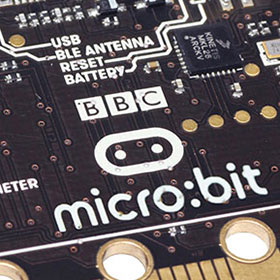Recent Stories
- Businesses urged to tap into science and technology young talent
- Digital relay baton enables remote crowd cheering of athletes
- Health Innovation Campus moves a step closer
- £7.1 million R&D boost for North West businesses
- Centre of excellence created for the next industrial revolution
- Artificial intelligence toolkit spots new child sexual abuse media online
- Strategic partnership set to help plug cyber security skills gap
- What your choice of smartphone says about you
- InfoLabTree: Discover the Story
- novi.digital Launch Event - 'An Event to Help Businesses Grow Online'
RSS Feeds
RSS feeds can deliver the latest InfoLab21 news and events direct to your browser without you having to visit the website.
In most browsers you can click on an RSS link and choose to subscribe to the feed to add it to your favourites or bookmarks.
Lancaster University helps BBC inspire 1 million coders

Lancaster University computer scientists are at the forefront of a UK-wide BBC initiative launched today to inspire a new generation to get creative with coding, programming and digital technology.
The BBC and partners today unveiled the BBC micro:bit – a pocket-sized, codeable computer that allows children to get creative with technology. In the BBC’s most ambitious education initiative for 30 years, up to 1 million devices will be given to every 11 or 12 year old child in year 7 or equivalent across the UK, for free this October.
Computer scientists at Lancaster University, led by Dr Joe Finney, helped develop the coding and programming behind the tiny device. The University is also working closely with teachers to support the introduction of Computing into the national curriculum in Primary Schools.
In the 1980s, the BBC Micro introduced many children to computing for the first time. Part of the BBC’s 2015 Make it Digital initiative, the BBC micro:bit builds on the legacy of the Micro for the digital age, and aims to inspire young people to get creative with digital; develop core skills in science, technology and engineering; and unleash a new generation of digital makers, inventors and pioneers.
The UK currently faces a critical skills shortage in the technology sector and the BBC and their partners aim to help change that.
Tony Hall, Director General of the BBC said: “Channelling the spirit of the Micro for the digital age, the BBC micro:bit will inspire a new generation in a defining moment for digital creativity here in the UK. All you need is your curiosity, creativity and imagination – we’ll provide the tools. This has the power to be transformative for the UK. The BBC is one of the few organisations in the world that could convene something on this scale, with such an unprecedented partnership at its core.”
Lancaster University’s Pro-Vice-Chancellor (Education) Professor Sharon Huttly said: “Lancaster University has an excellent track record in Computer Science research, teaching and public engagement. BBC Make it Digital and Micro Bit provide us with the opportunity to combine these strengths and reach out to every Year 7 child across the country to inspire and motivate the next generation of scientists.”
The BBC micro:bit is a pocket-sized computer that you can code, customise and control to bring your digital ideas, games and apps to life. Measuring 4cm by 5cm, and designed to be fun and easy to use, something simple can be coded in seconds – like lighting up its LEDs or displaying a pattern – with no prior knowledge of computing. All that’s needed is imagination and creativity.
The BBC micro:bit also connects to other devices, sensors, kits and objects, and is a great companion to Arduino, Galileo, Kano, littleBits and Raspberry Pi, acting as a spring board to more complex learning.
Key features include:
- 25 red LEDs to light up, flash messages, create games and invent digital stories 2 programmable buttons activated when pressed. Use the micro:bit as a games controller. Pause or skip songs on a playlist.
- On-board motion detector or “accelerometer” that can detect movement and tell other devices you’re on the go. Featured actions include shake, tilt and freefall. Turn the micro:bit into a spirit level. Light it up when something is moved. Use it for motion-activated games.
- A built-in compass or “magnetometer” to sense which direction you’re facing, your movement in degrees, and where you are. Includes an in-built magnet, and can sense certain types of metal.
- Bluetooth Smart to connect to the internet and interact with the world around you. Connect the micro:bit to other micro:bits, devices, kits, phones, tablets, cameras and everyday objects all around. Share creations or join forces to create multi-micro:bit masterpieces. Take a selfie. Pause a DVD or control your playlist.
- 5 Input and Output (I/O) rings to connect the micro:bit to devices or sensors using crocodile clips or 4mm banana plugs. Use the micro:bit to send commands to and from the rings, to power devices like robots and motors.
The project’s 29 partners include: ARM, Barclays, BBC, element14, Freescale, Lancaster University, Microsoft, Nordic Semiconductor, Samsung, ScienceScope, Technology Will Save Us and the Wellcome Trust.
Tue 07 July 2015



